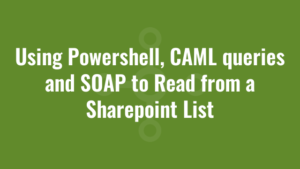Similarly to my post here this post describes how we can use Powershell to extract information from a Sharepoint list.
$list = $null
$service = $null
# The uri refers to the path of the service description, e.g. the .asmx page
$uri = "http://xxx/_vti_bin/Lists.asmx"
# Create the service
$service = New-WebServiceProxy -uri $uri -Namespace SpWs -UseDefaultCredential
$service.url = $uri
# The name of the list
$listName = "331609D1-793D-4075-BC88-570956C6D729"
$xmlDoc = new-object System.Xml.XmlDocument
$queryOptions = $xmlDoc.CreateElement("QueryOptions")
$queryOptionsString = "<IncludeMandatoryColumns>FALSE</IncludeMandatoryColumns><DateInUtc>TRUE</DateInUtc><ViewAttributes Scope='RecursiveAll' />"
$queryOptions.set_innerXML($queryOptionsString)
$query = $xmlDoc.CreateElement("Query")
$queryString = "<OrderBy><FieldRef Name='Title' Ascending='TRUE' /></OrderBy>"
$query.set_innerXML($queryString)
$rowLimit = "999"
try{
$list = $service.GetListItems($listName, "", $query, $viewFields, $rowLimit, $queryOptions, "")
}
catch{
[System.Exception]
write-host ($_.Exception).Message
}Once I’d received the list of values back as a System.Xml.XmlNode object, I added them to a Combobox like this:
foreach ($node in $list.data.row) {
$customerBox.items.add($node.GetAttribute("ows_Title")) | Out-Null
}Incidentally, I needed to retrieve some more values from my Sharepoint list for use later on. Rather than doing another Web service request, I decided to store the values I needed during the first request so I could use them later. I updated the for loop above like so:
foreach ($node in $list.data.row) {
$FTPhash.Add($node.GetAttribute("ows_Title"),(@{
"uname" = ($node.GetAttribute("ows_FTP_x0020_Username"))
"pword" = ($node.GetAttribute("ows_FTP_x0020_Password"))
}))
$customerBox.items.add($node.GetAttribute("ows_Title")) | Out-Null
}You can see that we’ve used a hash table to store the results. Not only is it a hash table, but it’s a hash table inside another hash table!!
A hash table is similar to the VBScript Dictionary object in that it stores key-value pairs. In our example above, the key is:
$node.GetAttribute(“ows_Title”)
and the value is another hash table of:
@{
“uname” = ($node.GetAttribute(“ows_FTP_x0020_Username”))
“pword” = ($node.GetAttribute(“ows_FTP_x0020_Password”))
}
and how do we retrieve these values? Easy…
$ftpuname = $FTPhash.Get_Item($customerBox.SelectedItem).uname
$ftppassword = $FTPhash.Get_Item($customerBox.SelectedItem).pword
**NOTE**
I’ve just used this code in another environment and for a different client. I was getting:
Exception calling “GetListItems” with “7” argument(s)
And the detailed exception didn’t tell me much. It turns out it was to do with the service URL.
If i initially created the service with a URL such as https://domain.co.uk/sites/IMT/deskserv/_vti_bin/Lists.asmx and immediately afterwards I echoed out:
$service.urlIt would return the URL as being: https://domain.co.uk/sites/IMT/Lists.asmx!! (Notice the difference!) This is actually the site URL! Hence I now explicitly set the URL of the web service proxy after we create it using:
$service.url = $uri





1 thought on “Using Powershell, CAML queries and SOAP to Read from a Sharepoint List”